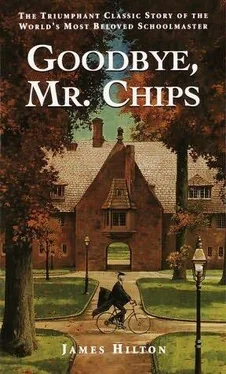"Just like Chips," was commented afterward. "He gets away with it. I suppose at that age anything you say to anybody is all right..."
10
In 1900 old Meldrum, who had succeeded Wetherby as Head and had held office for three decades, died suddenly from pneumonia; and in the interval before the appointment of a successor, Chips became Acting Head of Brookfield. There was just the faintest chance that the Governors might make the appointment a permanent one; but Chips was not really disappointed when they brought in a youngster of thirty-seven, glittering with Firsts and Blues and with the kind of personality that could reduce Big Hall to silence by the mere lifting of an eyebrow. Chips was not in the running with that kind of person; he never had been and never would be, and he knew it. He was an altogether milder and less ferocious animal.
Those years before his retirement in 1913 were studded with sharply remembered pictures.
A May morning; the clang of the School bell at an unaccustomed time; everyone summoned to assemble in Big Hall. Ralston, the new Head, very pontifical and aware of himself, fixing the multitude with a cold, presaging severity. "You will all be deeply grieved to hear that His Majesty King Edward the Seventh died this morning... There will be no school this afternoon, but a service will be held in the Chapel at four-thirty."
A summer morning on the railway line near Brookfield. The railwaymen were on strike, soldiers were driving the engines, stones had been thrown at trains. Brookfield boys were patrolling the line, thinking the whole business great fun. Chips, who was in charge, stood a little way off, talking to a man at the gate of a cottage. Young Cricklade approached. "Please, sir, what shall we do if we meet any strikers?"
"Would you like to meet one?"
"I—I don't know, sir."
God bless the boy—he talked of them as if they were queer animals out of a zoo! "Well, here you are, then—umph—you can meet Mr. Jones—he's a striker. When he's on duty he has charge of the signal box at the station. You've put your life in his hands many a time."
Afterward the story went round the School: There was Chips, talking to a striker. Talking to a striker. Might have been quite friendly, the way they were talking together.
Chips, thinking it over a good many times, always added to himself that Kathie would have approved, and would also have been amused.
Because always, whatever happened and however the avenues of politics twisted and curved, he had faith in England, in English flesh and blood, and in Brookfield as a place whose ultimate worth depended on whether she fitted herself into the English scene with dignity and without disproportion. He had been left a vision that grew clearer with each year—of an England for which days of ease were nearly over, of a nation steering into channels where a hair's breadth of error might be catastrophic. He remembered the Diamond Jubilee; there had been a whole holiday at Brookfield, and he had taken Kathie to London to see the procession. That old and legendary lady, sitting in her carriage like some crumbling wooden doll, had symbolised impressively so many things that, like herself, were nearing an end. Was it only the century, or was it an epoch?
And then that frenzied Edwardian decade, like an electric lamp that goes brighter and whiter just before it burns itself out.
Strikes and lockouts, champagne suppers and unemployed marchers, Chinese labour, tariff reform, H. M. S. Dreadnought, Marconi, Home Rule for Ireland, Doctor Crippen, suffragettes, the lines of Chatalja...
An April evening, windy and rainy; the fourth form construing Vergil, not very intelligently, for there was exciting news in the papers; young Grayson, in particular, was careless and preoccupied. A quiet, nervous boy.
"Grayson, stay behind—umph—after the rest."
Then:—
"Grayson, I don't want to be—umph—severe, because you are generally pretty good—umph—in your work, but to-day—you don't seem—umph—to have been trying at all. Is anything the matter?"
"N-no, sir."
"Well—umph—we'll say no more about it, but—umph—I shall expect better things next time."
Next morning it was noised around the School that Grayson's father had sailed on the Titanic, and that no news had yet come through as to his fate.
Grayson was excused lessons; for a whole day the School centred emotionally upon his anxieties. Then came news that his father had been among those rescued.
Chips shook hands with the boy. "Well, umph—I'm delighted, Grayson. A happy ending. You must be feeling pretty pleased with life."
"Y-yes, sir."
A quiet, nervous boy. And it was Grayson Senior, not Junior, with whom Chips was destined later to condole.
11
And then the row with Ralston. Funny thing, Chips had never liked him; he was efficient, ruthless, ambitious, but not, somehow, very likable. He had, admittedly, raised the status of Brookfield as a school, and for the first time in memory there was a longish waiting list. Ralston was a live wire; a fine power transmitter, but you had to beware of him.
Chips had never bothered to beware of him; he was not attracted by the man, but he served him willingly enough and quite loyally. Or, rather, he served Brookfield. He knew that Ralston did not like him, either; but that didn't seem to matter. He felt himself sufficiently protected by age and seniority from the fate of other masters whom Ralston had failed to like.
Then suddenly, in 1908, when he had just turned sixty, came Ralston's urbane ultimatum. "Mr. Chipping, have you ever thought you would like to retire?"
Chips stared about him in that book-lined study, startled by the question, wondering why Ralston should have asked it. He said, at length: "No—umph—I can't say that—umph—I have thought much about it—umph—yet."
"Well, Mr. Chipping, the suggestion is there for you to consider. The Governors would, of course, agree to your being adequately pensioned."
Abruptly Chips flamed up. "But—umph—I don't want—to retire. I don't—umph—need to consider it."
"Nevertheless, I suggest that you do."
"But—umph—I don't see—why—I should!"
"In that case, things are going to be a little difficult."
"Difficult? Why—difficult?"
And then they set to, Ralston getting cooler and harder, Chips getting warmer and more passionate, till at last Ralston said, icily: "Since you force me to use plain words, Mr. Chipping, you shall have them. For some time past, you haven't been pulling your weight here. Your methods of teaching are slack and old-fashioned; your personal habits are slovenly; and you ignore my instructions in a way which, in a younger man, I should regard as rank insubordination. It won't do, Mr. Chipping, and you must ascribe it to my forbearance that I have put up with it so long."
"But—" Chips began, in sheer bewilderment; and then he took up isolated words out of that extraordinary indictment. "Slovenly—umph—you said—?"
"Yes, look at the gown you're wearing. I happen to know that that gown of yours is a subject of continual amusement throughout the School."
Chips knew it, too, but it had never seemed to him a very regrettable matter.
He went on: "And—you also said—umph—something about—insubordination—?"
"No, I didn't. I said that in a younger man I should have regarded it as that. In your case it's probably a mixture of slackness and obstinacy. This question of Latin pronunciation, for instance—I think I told you years ago that I wanted the new style used throughout the School. The other masters obeyed me; you prefer to stick to your old methods, and the result is simply chaos and inefficiency."
At last Chips had something tangible that he could tackle. "Oh, that!" he answered, scornfully. "Well, I—umph—I admit that I don't agree with the new pronunciation. I never did. Umph—a lot of nonsense, in my opinion. Making boys say 'Kickero' at school when—umph—for the rest of their lives they'll say 'Cicero'—if they ever—umph —say it at all. And instead of 'vicissim'—God bless my soul—you'd make them say, 'We kiss 'im'! Umph—umph!" And he chuckled momentarily, forgetting that he was in Ralston's study and not in his own friendly form room.
Читать дальше











